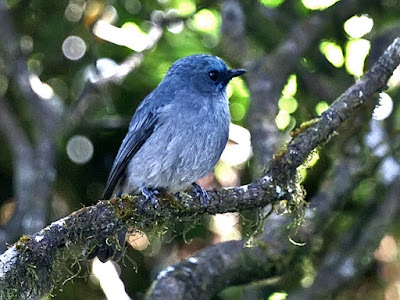Anduru Nil Masimara - The Dusky-Blue Flycatcher (Eumyias sordida)
Identification
Size Sparrow-sized. Sexes similar, but the juveniles are brown, heavily spotted on head, back, wing-coverts and breast with pale buff; flight feathers are broadly margined with blue-grey.
Size Sparrow-sized. Sexes similar, but the juveniles are brown, heavily spotted on head, back, wing-coverts and breast with pale buff; flight feathers are broadly margined with blue-grey.
Behavior
It
is not a shy bird. It feeds mainly on flying insects, beetles,
caterpillars and the like, but also eats berries such as wild yellow
rasberry, lantana, etc. It has a sweet rather loud song.
The main breeding season is in
the first half of the year, March and April being the favourite months;
but a second -or a third-brood is often reared in August-September. The
nest is a compact mass of green moss, with a neat, rather deep cup in
the top, lined with fine black fibers, probably fern roots. The site is
always well shaded, but not always well concealed. The normal clutch is
two, but occasionally three eggs are laid. They are pale pink, freckled
all over with pale burnt sienna, which often formas a zone, or cap, at
the large end. They measure about 20.5 X 14.8 mm.
Location
The flycatcher is
confined to the hills above 2,000 feet, but is not common below 3,000
feet. It inhabits forest or well-wooded ravines on estates, gardens,
etc., where plenty of shady trees give it the seclusion it loves.
Gallery









Comments
Post a Comment